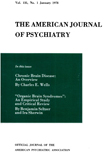Use of the Research Diagnostic Criteria and the Schedule for Affective Disorders and Schizophrenia to study affective disorders
Abstract
In a pilot study of 150 manic or depressive patients, the authors used the Research Diagnostic Criteria (RDC) and the Schedule for Affective Disorders and schizophrenia (SADS) to perform preliminary analysis of symptom pictures of the index episode of different diagnostic groups, joint diagnostic classification of the different subtypes of major depressive disorder, and differential outcome by diagnostic groups. The results suggest that schizophrenic symptoms in affective disorders do have diagnostic and prognostic significance, that the term "psychotic depression" should be limited to impaired reality testing without reference to degree of incapacitation, that situational-nonsituational and endogenous-nonendogenous classifications are separate depressive subtypes, and that it may not be true that patients with endogenous major depressive disorder have a better prognosis than patients with nonendogenous depression.
Access content
To read the fulltext, please use one of the options below to sign in or purchase access.- Personal login
- Institutional Login
- Sign in via OpenAthens
- Register for access
-
Please login/register if you wish to pair your device and check access availability.
Not a subscriber?
PsychiatryOnline subscription options offer access to the DSM-5 library, books, journals, CME, and patient resources. This all-in-one virtual library provides psychiatrists and mental health professionals with key resources for diagnosis, treatment, research, and professional development.
Need more help? PsychiatryOnline Customer Service may be reached by emailing [email protected] or by calling 800-368-5777 (in the U.S.) or 703-907-7322 (outside the U.S.).



